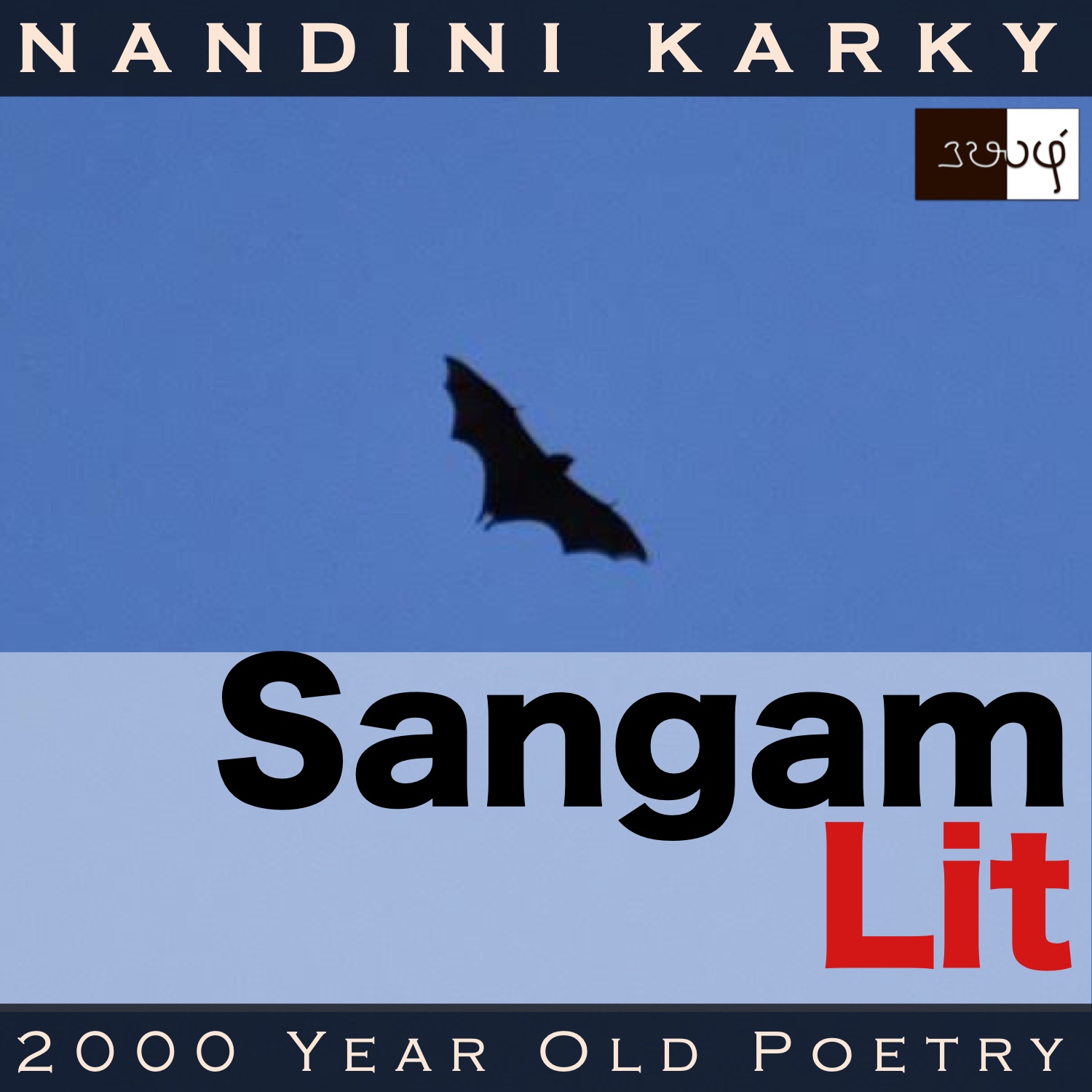Podcast: Play in new window | Download
Subscribe: Apple Podcasts | Spotify | Amazon Music | Android | iHeartRadio | TuneIn | RSS | More

In this episode, we perceive the recollection of a past kindness, as portrayed in Sangam Literary work, Kurunthogai 201, penned by an anonymous poet. Set in the mountains of ‘Kurinji’, the verse speaks in the voice of the lady to the confidante, in response to the friend’s words when she visits the lady’s marital home.
அமிழ்தம் உண்க-நம் அயல் இலாட்டி,
பால் கலப்பன்ன தேக் கொக்கு அருந்துபு,
நீல மென் சிறை வள் உகிர்ப் பறவை
நெல்லிஅம் புளி மாந்தி, அயலது
முள் இல் அம் பணை மூங்கிலில் தூங்கும்
கழை நிவந்து ஓங்கிய சோலை
மலை கெழு நாடனை வரும் என்றோளே!
A verse that makes us taste the sweet and sour of life! The opening words ‘அமிழ்தம் உண்க- நம் அயல் இலாட்டி’ meaning ‘let her eat ambrosia, the lady who lives near our house’ holds within a heartfelt wish for another. When I read these words, I knew I had encountered this wish before and recollected that it was in Kurunthogai 83, where the lady’s foster-mother is blessed thus. Close enough to ambrosia is the ‘sweet mango savoured’ in ‘தேக் கொக்கு அருந்துபு’. A single-line portrait appears in ‘நீல மென் சிறை வள் உகிர்ப் பறவை’ referring to ‘a bird with blue-hued soft wings and sharp nails’. No surprise that this refers to a bat! Although the way the ‘black’ of the wings is mentioned as ‘blue’ gives us insight about the colour perceptions of Sangam people. Linguistic research indicates that many cultures have the same word for black, blue and even green. Moving on, it’s the turn of our taste buds to tingle when sensing ‘நெல்லிஅம் புளி’ meaning ‘the sour gooseberry’. The phrase ‘முள் இல் அம் பணை மூங்கில்’ meaning ‘the beautiful fleshy stalks of bamboo without thorns’ brings before our eyes the quintessential element of this geographic region. Ending with the words ‘மலை கெழு நாடனை வரும் என்றோளே’ meaning ‘she said that the lord of the mountains would arrive’, the verse welcomes us to know more!
Sweet mangoes and sour gooseberries present the contrast in the hues of life. The context reveals that the man and lady had recently married and the confidante comes to the lady’s marital home for a visit. Seeing how the lady is inseparable from her husband, the confidante asks wonderingly how the lady could bear the separation with the man before the wedding. To the confidante, the lady replies, “Let our neighbour savour the elixir of life! After relishing the mango fruit, akin to milk mixed with honey, the blue hued, soft-winged, sharp-nailed bird eats sour gooseberry and then hangs from the thornless, thick bamboo nearby in the orchards, where clusters of bamboos soar high. Such scenes are to be seen in the mountains of the lord. For she had declared, ‘he would return’!” With these words, the lady reveals the mystery of how she had the strength to bear with the man’s separation before marriage.
What does a friendly neighbour have to do with the lady’s strength? Let’s explore by listening to the lady’s words closely. The first words the lady utters in response is a blessing upon a woman, who was their neighbour, when the lady lived in her parents’ home. Then, without revealing why she’s blessing this person, the lady turns to depict an image of a bat, first relishing a mango fruit, one that is as sweet as a drink of milk and honey, and then, flying with its gentle wings towards a gooseberry tree and plucking the sour fruit with its sharp nails. Having had a taste of both the sweet fruit and the sour one, it rests in the thorn-free beautiful bamboo stalks in the man’s country. And so, we understand the entire scene is a description of the man’s land. Finally, she concludes with the words that her neighbour had said that the man would return to claim her hand.
That is the big reveal! When the lady had confided about the man, that neighbour seems to have spoken positive words predicting that the man would be back to marry the lady. Those words seem to have been a raft to the lady as she was tossed in the storms of separation. When we peer closer at the image of the bat savouring the sweet and sour fruits and then resting, we will understand that it’s a metaphor for the lady’s past. When she was in the initial days of courtship, in the company of the man, it was like savouring sweet mango and when he parted away to gather wealth for their wedding, life turned sour for the lady, indeed. But, in the end, she’s happy in her husband’s home, and she narrates about the peace here, by that nuanced reference to the ‘thornless’ nature of the bamboos in the man’s country. It was that neighbour’s words that made me hold on through the separation, the lady explains to the confidante. This verse seems to reiterate the truth in the words of philosophers over the ages asking us to never underestimate the power of a kind word or deed, no matter how small. All the neighbour said was a prediction that the man would return and that was enough to turn the lady’s life around. Perhaps, a nudge to us to speak kind and positive words, so that someone around us can bear the ups and downs, the sweet and sour of life, with a strong smile!




Share your thoughts...